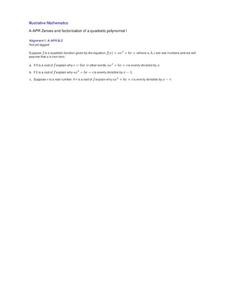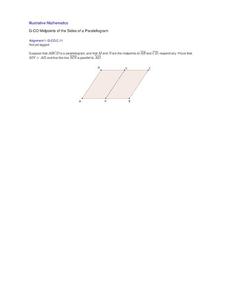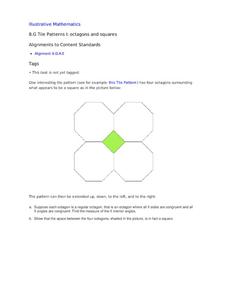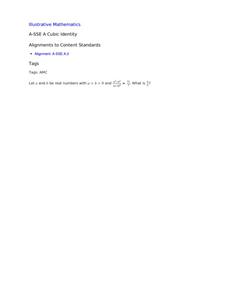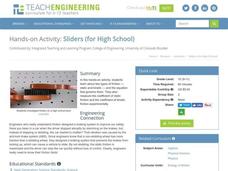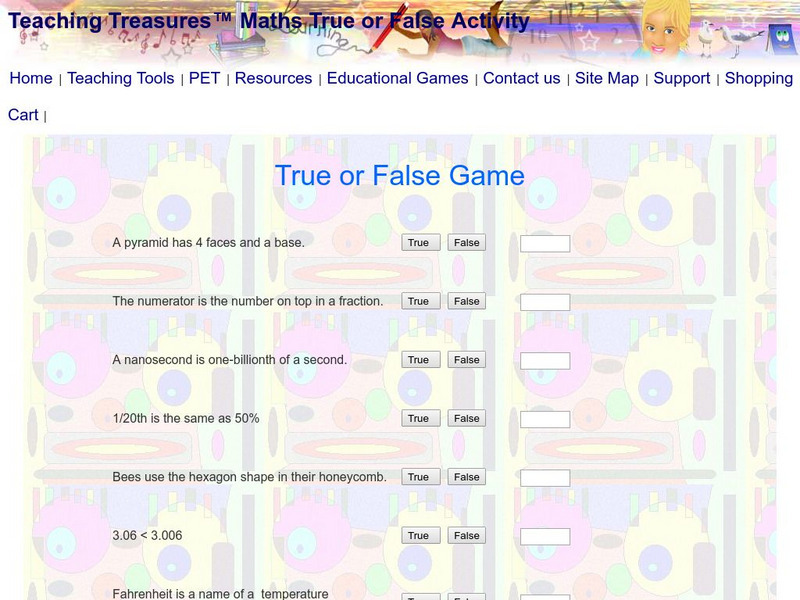West Contra Costa Unified School District
Division (No Remainders)
Help young mathematicians build a solid understanding of division with this base ten block activity. With the help of these popular math manipulatives, children model different math problems in order to reinforce the...
Illustrative Mathematics
Shortest Line Segment from a Point P to a Line L
One of the hardest skills for many young geometers to grasp is to move beyond just declaring obvious things true, and really returning to fundamental principles for proof. This brief exercise stretches those proving muscles as the...
Illustrative Mathematics
Equivalent Expressions?
Pre-algebra pupils need to understand that two expressions are only equal if they have the same value. Show them that once the expression is multiplied by a number, the value of the expression changes. It makes for a good lead-in to...
Illustrative Mathematics
Checking a calculation of a decimal exponent
In a writing prompt, learners are asked to check the calculation of a decimal exponent without a calculator. Use as an opener or assessment after studying fractional exponents. Requires a strong understanding of exponents and roots to...
Illustrative Mathematics
Representing Half of a Circle
Geometric shapes make great visual models for introducing young mathematicians to the concept of fractions. Looking at a series of four circles, learners are asked to determine whether or not one half of each circle is shaded. To support...
Illustrative Mathematics
Temperatures in degrees Fahrenheit and Celsius
Learners investigate the relationship between the Fahrenheit and Celsius temperature scales. Given two data points, they construct a linear function to describe the relationship, find the inverse of the function, and make observations...
Illustrative Mathematics
Grass Seedlings
Plants never grow at the same rate, and that is the antithesis for this word problem involving multiplication of fractions. On the worksheet, Raul notices that Pablo's seedlings are 1 1/2 times as tall, and Celina's seedlings are 3/4 as...
Illustrative Mathematics
Zeroes and factorization of a quadratic polynomial I
This activity uses the division algorithm and the definition of a zero/root of a function to guide your class to see the relationship between zeros and factors of a general quadratic, which can later be generalized to the Remainder...
Illustrative Mathematics
Midpoints of the Sides of a Paralellogram
This task asks learners to prove that the segment joining the midpoints of two sides of a parallelogram is both congruent and parallel to an adjacent side of the parallelogram. The activity would be good to use in a discussion about how...
Curated OER
Tile Patterns I: Octagons and Squares
This can be used as a critical thinking exercise in congruence or as a teaching tool when first introducing the concept. Four octagons are arranged in such a way that a square is formed in the middle. With this information, geometry...
Lincoln Public Schools
Cereal Box Project
Challenge your class with this fun and engaging engineering design project. The goal, to create a brand new cereal complete with a list of ingredients, a name and logo, and a box to hold it in. Starting with a survey to determine the...
PBL Pathways
Medical Insurance 2
Make an informed decision when choosing a medical insurance provider. An engaging lesson asks your classes to write piecewise models to represent the cost of different medical plans. The project-based learning activity is a variation of...
101 Questions
Hot Coffee
Your classes will be wide awake during a piping hot lesson! Introduce the resource with a video of the world-record-breaking cup of coffee. Learners work to determine the volume of the cup of coffee to predict if it will break the record.
Illustrative Mathematics
An Integer Identity
Challenge algebra learners to use the difference of cubes to solve this problem. Once your charges have taken out the factor (a - b), combined the like terms and set them equal to zero, the problem becomes a factorable quadratic...
Teach Engineering
The Great Gravity Escape
Groups simulate an orbit using a piece of string and a water balloon. Individuals spin in a circular path and calculate the balloon's velocity when the clothes pin can no longer hold onto the balloon.
Illustrative Mathematics
Listing Fractions in Increasing Size
Increase the depth of your class's fractional number sense with this number-ordering activity. Given four fractions, each with different numerators and denominators, young learners are asked to place them in order from smallest to...
Illustrative Mathematics
Right Triangles Inscribed in Circles I
One of the basic properties of inscribed angles gets a triangle proof treatment in a short but detailed exercise. Leading directions take the learner through identifying characteristics of a circle and how they relate to angles and...
Curated OER
Forms of Exponential Expressions
Your young physicists analyze the forms of four equivalent exponential expressions representing an amount of a radioactive material in a substance. They show how each expression is equivalent to the others and what aspects of the decay...
Curated OER
Tangent Lines and the Radius of a Circle
Your Geometry learners will collaboratively prove that the tangent line of a circle is perpendicular to the radius of the circle. A deliberately sparse introduction allows for a variety of approaches to find a solution.
Illustrative Mathematics
Irrational Numbers on the Number Line
There are four irrational numbers that participants need to graph. Pi(π), -(½ x π), and √17 are easy to approximate with common rational numbers. On the other hand, the commentary describing the irrational number 2√2 is not...
Illustrative Mathematics
Zeroes and factorization of a non polynomial function
Functions behaving badly: the squaring function and the absolute value function are both zero at x=0. Yet when you divide each by x, different things happen. Here, your class will explore each scenario as a means to adding depth to their...
Illustrative Mathematics
Baseball Cards
Here is a resource that demonstrates growth and the initial state of an equation. In this case, your class will be looking at baseball collections. How many baseball cards did the collector start out with, and how many were added or...
Teach Engineering
Sliders (for High School)
Slip sliding away. Groups investigates the two types of friction by running an experiment that allows them to calculate the coefficient of static friction and the coefficient of kinetic friction. The experiment uses a box, a...
Teaching Treasures Publications
Teaching Treasures: Year Six Math True or False
Assess your aptitude for math facts with this interactive true or false questionnaire. Questions cover a variety of math concepts and topics that should be familiar to most young mathematicians. Answers can be checked immediately.







